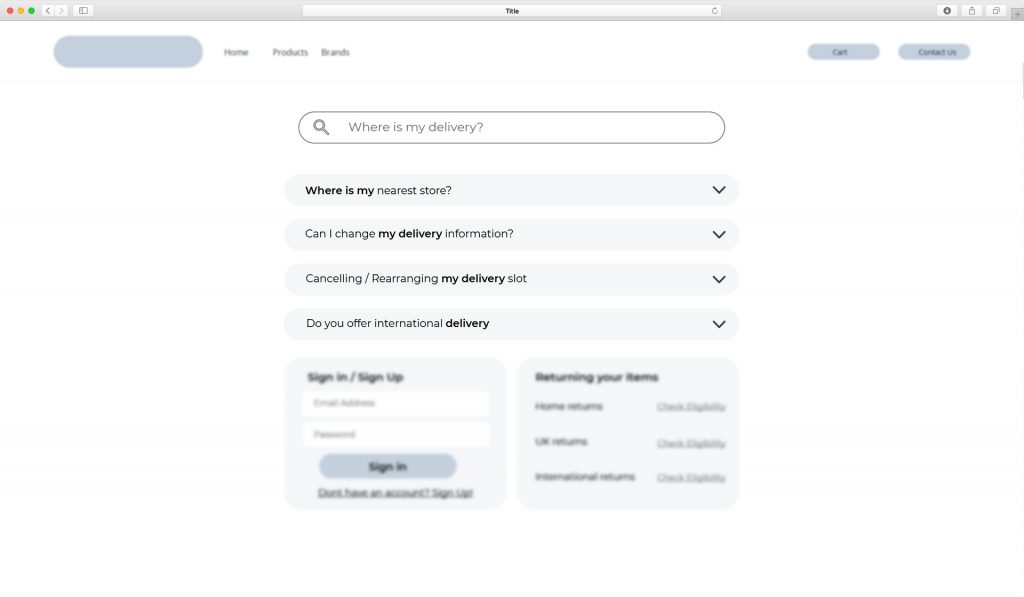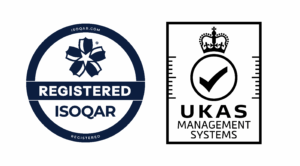There are two key approaches that companies take to facilitate this. They include an FAQ page or a knowledge base.
But how do they differ?
FAQ Pages
Insufficient Data Leads to Insufficient FAQs
Generally presented on a static web page, FAQs are simply a list of frequently asked questions and answers. They aim to cover and address customers’ routine questions online and effortlessly, but unfortunately often miss the mark. Due to the lack of knowledge analytics, the frequently asked questions and answers that are included on such a page are usually based off gut or opinion rather than data itself. Because there is no data stored regarding popularity of routine questions, many companies don’t truly know their FAQs and rely on guesswork. Consequently, the FAQ content is often lacking, limited or general, resulting in customers feeling frustrated – which in customer service is exactly what you want to avoid.

Lack of Ownership Results in Inefficiencies
When it comes to the management of an FAQ page, editing, adding and updating can prove cumbersome. Built using basic code, even making one simple update to the content can involve a long chain of command. For instance, someone at head office notifies their team who must tell the web team or agency, who must then notify the developers to make a change. This inefficient way of information sharing means that mistakes are easily made or customers miss out on vital information due to FAQ page mechanics. This is only exacerbated in larger companies where small changes are not made ad-hoc, but instead they are collected and sent in bulk, denying customers of even more important information.
Information Architecture: The Lack Thereof
FAQs page do not utilise information architecture: the structural design of shared information for efficient user experience. Without the organisation, labelling, categorisation and lack of effective search systems, FAQs cannot deliver a positive customer experience. Instead, customers often find themselves going around in circles with no adequate results found and a limited access to content.
Existing Customers’ Needs Are Not Catered To
Furthermore, the content on FAQ pages generally address the basic queries of new customers, for example opening hours, delivery information, returns policies and so on. What they fail to cater to are the needs of your regular customers who will have more detailed routine queries. Questions that are product related, how-tos and purchase follow ups. Whilst customer acquisition is important, neglecting existing customers can prove detrimental to business. Consider the importance of customer value and loyalty and choose a knowledge tool that suits both new and existing customers’ needs.
Knowledge Bases
A knowledge base on the other hand acts as your company’s centralised library of knowledge, connecting to all outlets to provide customers with a wide range of accurate, consistent answers.
Ownership Allows for Efficient, Real-time Knowledge Updates
A knowledge base is a fundamental knowledge management tool that is overseen by a Knowledge Manager to ensure the right information can be found by the right people at the right time. It can store thousands of knowledge articles containing key questions and answers, multimedia and downloads. The content residing in a knowledge base can be developed, updated and edited in real-time, these changes are instantly reflected on your website and any internal users are notified to promote transparency. Such knowledge is intricately organised using multi-layered algorithms, Natural Language Processing (NLP), categories and advanced search systems to ensure customers are served adequate results regardless of how a query is phrased.
Knowledge Analytics Reveal Your Most Popular Questions and More
Because knowledge bases are built on AI, every customer interaction is stored as data and can be interpreted using its analytics. This is how knowledge becomes a true asset, providing valuable intel on customer behaviour, product and services, errors, bugs and of course, what a company’s most frequently asked questions are.
One Centralised Source Promotes Company-wide Consistency
Companies that implement knowledge base software benefit from operational efficiency. Because all knowledge belongs to one single source, the risk of error is significantly reduced. There is no long chain of command as a Knowledge Manager who is committed to optimising knowledge will amend content whenever is necessary. A knowledge base’s agility allows it to integrate with every customer facing and internal portal your company has, whether its live chat, web self-service , chatbot or internal knowledge , the results generated come from the same source every time for consistency and quality.
All Customer Types Are Served Through A Range of Tools
Unlike the static web page that FAQs are hosted on, a knowledge base gives companies choices as to how to present knowledge to their customers, including:
A self-service pop-up
A self-service widget
A self-service page
A chatbot
Live Chat
A combination or all of the above
Find out more about knowledge base integrations here.
This allows a greater volume of customers with different needs, at different stages of the buying cycle and with different query types to be catered to, enhancing CX, the likelihood that the query is resolved and therefore positive CSAT scores.
The key differences between a KB and FAQ page
| Knowledge Base | FAQ page | |
| Artificial intelligence: AI and NLP are utilised to enable First Contact Resolution and therefore reduce overall costs. | ✓ | ✗ |
| Knowledge analytics: Knowledge analytics are available to provide intel on knowledge content, customer behaviour, errors and more. | ✓ | ✗ |
| Ownership: A dedicated Knowledge Manager has full ownership to ensure smooth and efficient operations. | ✓ | ✗ |
| Consistent knowledge: One centralised source of information is used, allowing for consistent company-wide knowledge sharing. | ✓ | ✗ |
| Information Architecture: Information is organised using search systems, categorisation and labelling to help users find the information they require. | ✓ | ✗ |
| Focus on new and existing customers: Knowledge can be presented in a variety of ways to serve customers at different buyer stages. | ✓ | ✗ |
Impact on Consistency of Information
A key difference between FAQs and a knowledge base involves the consistency of information that is delivered to customers. The processes behind an FAQ page are inefficient and different sources of information are updated at different times leading to discrepancies which can prove detrimental for companies.
A small information divergence is annoying for customers, proving time wasting as they must take care of problem solving and discrepancies by themselves, this in turn can affect customer satisfaction resulting in poor CSAT scores.
However, what is more damaging for a brand is when a major update is not cohesive across channels and therefore the FAQ page is not changed in a timely manner. Inconsistencies in major delivery updates or critical allergy announcements can not only result in influxes of complaints that lead to a bad reputation, but more seriously, PR nightmares, legal complications and at worst, someone is hurt.
It is crucial for business that the information served to customers if always consistent, up-to-date and accurate. All of this can be guaranteed using knowledge base software. Because all information outlets, such as self-service pages, chatbots and live chat tools get their information from one centralised source – the knowledge base – the risk of inconsistencies are significantly reduced encouraging smoother operations and happier customers.
Impact on Operational Efficiency
Another fundamental difference between FAQs and a knowledge base includes operational efficiency, in particular operational costs and overheads.
Knowledge bases are significantly more cost efficient to run than FAQ pages, this is because the updating of an FAQ page requires a long chain of command, multiple people and teams, plus several layers of signoffs. This equates to an accumulation of high staffing costs. A knowledge base on the other hand, is managed, maintained and updated by one Knowledge Manager, removing all operational costs that would otherwise be associated with an FAQ page’s operations.
When it comes to running an FAQ page VS running a knowledge base, an FAQ page is considerably more expensive. The larger your company is, the larger the cost gap will grow.
Due to a knowledge base’s depth of answers available and the agile AI-powered search system that customers use to retrieve results, contact levels are significantly reduced, which subsequently cuts overall customer service and contact centre costs. In fact, a study by Gartner revealed that an 18% reduction in support costs occurred by encouraging knowledge management tools such as a knowledge base. Because a knowledge base has the capability to automate routine queries – giving customers the tools they need to answer their own questions online – agent assisted channels are given more capacity. These expensive contact channels like email or telephone now have a greater bandwidth to deal with customer issues that are more complex and require human assistance.
FAQ pages, in comparison, seldom provide customers with the answers they need, due to their simple setup, that unlike knowledge bases, are not built on AI or utilise NLP, they can never truly be a self-service tool. Instead they often send customers round in loops whereby customers’ frustrations only grow before inevitably having to call customer service to solve their problem. Their customer query has not been automated, high costs still occur and the customer is now annoyed.
To learn more about essential knowledge management tools, including knowledge bases, click here.
While it’s easy to get FAQs and a knowledge bases mixed up, the two are intricately different from one another. One includes a simple overview of basic information, whilst the other is an effective means to streamlined self-service. Most importantly, an FAQ page cannot be a substitute for a knowledge base.
Implementing a knowledge base into your customer service ecosystem helps to promote efficiency, reduce overheads, boost CX and of course improve CSAT scores. If you would like to learn more about knowledge management tools such as knowledge bases, you can do so here.
If you enjoyed this article and would like any advice regarding knowledge base solutions, please


